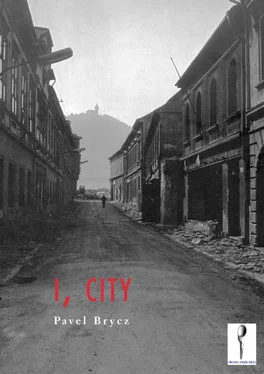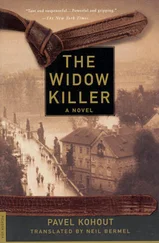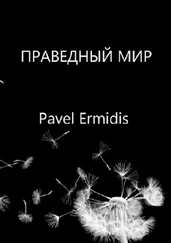Pavel Brycz - I, City
Здесь есть возможность читать онлайн «Pavel Brycz - I, City» весь текст электронной книги совершенно бесплатно (целиком полную версию без сокращений). В некоторых случаях можно слушать аудио, скачать через торрент в формате fb2 и присутствует краткое содержание. Год выпуска: 2006, Издательство: Twisted Spoon Press, Жанр: Современная проза, на английском языке. Описание произведения, (предисловие) а так же отзывы посетителей доступны на портале библиотеки ЛибКат.
- Название:I, City
- Автор:
- Издательство:Twisted Spoon Press
- Жанр:
- Год:2006
- ISBN:нет данных
- Рейтинг книги:5 / 5. Голосов: 1
-
Избранное:Добавить в избранное
- Отзывы:
-
Ваша оценка:
- 100
- 1
- 2
- 3
- 4
- 5
I, City: краткое содержание, описание и аннотация
Предлагаем к чтению аннотацию, описание, краткое содержание или предисловие (зависит от того, что написал сам автор книги «I, City»). Если вы не нашли необходимую информацию о книге — напишите в комментариях, мы постараемся отыскать её.
Dubliners
I, City
I, City — читать онлайн бесплатно полную книгу (весь текст) целиком
Ниже представлен текст книги, разбитый по страницам. Система сохранения места последней прочитанной страницы, позволяет с удобством читать онлайн бесплатно книгу «I, City», без необходимости каждый раз заново искать на чём Вы остановились. Поставьте закладку, и сможете в любой момент перейти на страницу, на которой закончили чтение.
Интервал:
Закладка:
One day, I sat down on a bench at the bus station. I didn’t want to go anywhere. A city can’t just uproot itself and take off to Prague whenever it wants to.
What would come of it?
Seventy thousand deserted!
But as I say, I wasn’t going anywhere.
I only inhaled the coffee from the plastic cup of a man who was sad, because he was drinking filtered coffee, without grinds, and so he didn’t know a thing about his future. He was convinced his future had ended a long time ago; that he was just the fossilized remains of a mammoth. On the nearby bench sat a beautiful young Gypsy woman, but the man would never have had the courage to ask her about his future.
Even the slyest Gypsy isn’t able to prophesize from the hands of people who have no future.
And so he just sat; he actually wasn’t going anywhere, or waiting for anyone, he wasn’t studying any schedule in order to find his way through life. He only drank coffee dully. The young Gypsy girl was of an entirely different order than the dark Gadjo. She was wearing an orange sweater and blue jeans. Rings with Czech garnets were like her lips. Lashes like brushes. She would paint her husband’s body with them, if she had a husband.
She didn’t. He let himself be read of his future, gave her a child and fled. The future had frightened him.
The two people sat, each in their own universe, each on their own bench.
They would never have met, if the stirrer of the story hadn’t happened to be hatred.
What an idiotic human quality.
A woman in a duffle coat, holding parcels in paper fastened with thick twine, came to the Gypsy’s bench. She laid into the Gypsy in a shrill voice: she’s nothing more than filth, defiling the entire country, she ought to go off to India or even further away, she ought to make an appointment with Hitler and the Nuremberg laws…
The petite Gypsy woman stood up.
“Please,” she asked the man, “could I sit next to you?”
“Yes, of course,” the man replied.
“That lady shouted at me as if I were a Gypsy…” the girl explained shyly, “but I actually don’t know if I am. My father’s name was Fernando Mattinelli.”
“Ma — tti — ne — lli?” the man sang.
“But that sounds Spanish or Italian.
“And what if you were! Man, if I were a Gypsy, I wouldn’t be sitting here drinking coffee. Ha, to have hot blood. Hell, even my coffee’s gone cold!”
“It wouldn’t bother you,” Miss Mattinelli smiled, “even if I were?”
“As long as it doesn’t bother you that I have a hard time getting a tan. I get freckles like someone was shitting on me through a fan.”
“And what would you do if you were a Gypsy?” asked Miss Mattinelli.
“Well, first thing I would go to a house in Jiřetín, take a knife and slit the throats of all the rabbits there,” said the man.
“For God’s sake, why would you do something like that?” She was appalled.
“Anything’s better than sitting here… anyway…” the man waved his hand.
“Those rabbits do you any harm?” Miss Mattinelli asked in a whisper.
“To hell with harm — they only made me happy, nibbling away at their alfalfa, and I fed them dandelion leaves through the grating…”
“So then what?”
“Well, they belonged to a friend of mine who asked me to take care of them while he went away, and while I was taking care of them he was off with my wife. Soon enough, my family was reproducing like rabbits.” The man gave a sigh.
“You too, mister? You also were trusting? I’m not the only one to have cherished a viper at my breast?” The Gypsy was incensed. “When I’m with a man, I banish all others from my head, and only that one, well — I give him everything; I want him to be in heaven with me; you know what I mean by heaven, don’t you? My momma told me it was my own fault that he left me for that fat waitress from the Astoria winebar — that it’s my fault I bathed him, I rubbed him with towels, I perfumed him for me and brought him everything he could ever want, right in front of his nose, like no waitress would ever do…”
“I have to tell you, Miss Mattinelli, you scare me. I’ve never been to this heaven you’re talking about. I worked like an ox with those rabbits, while another licked cream and another made my children.”
“Wow!” Miss Mattinelli burst into laughter, “another made my children, that’s great.”
“Now even you’re laughing about it,” sighed the man, “and you don’t even know my name. You are Mattinelli, your father was Fernando; no one would confuse you with anyone else; but I’m Novák. How many Nováks are there? Even the father of my children is Novák. How easy it was for my wife. She was and stayed Nováková. Terrible, no?”
The man quieted and looked at Miss Mattinelli.
But Miss Mattinelli immediately knew what to say to that, and she did: “Your father was Novák and that’s why you’re Novák. I wanted to be named Markowiczová after my mother, but Momma screamed at me: Your father loved you, so you’ll be Mattinelli and that’s the end of it. You see my father died the same day I was born. He celebrated my birth with friends, and then they rode drunk in a car. At a crossing, they were hit by a train. My father could have loved me only one day.”
“Damn,” was all Mr. Novák could say, remembering his own father. He looked at the Gypsy. He noticed that she had a picture in a frame, suspended at her waist on a belt. The picture was turned upside down and Mr. Novák became very curious.
“What do you have there?” he asked Miss Mattinelli.
“I’ll show it to you,” the Gypsy spoke in a whisper, “but only after…”
“After what?” Mr. Novák asked with trepidation.
“After I read your fate from your hand,” answered Miss Mattinelli, “I know how to do that. In that I’m a real Gypsy.” And at once she took Mr. Novák’s hand, so fast that he couldn’t protest. His sleeve slid up and revealed a wrist.
It showed her the seam of a suicide attempt.
Mr. Novák coughed in embarrassment.
“Your lifeline is long,” exclaimed the Gypsy, gazing numbly at the scar, “you can expect a long life, and love with a woman who will finally take you to heaven. You’ll be the happiest man and you’ll have plenty of your own children.”
“All right, Miss Mattinelli, now show me the picture,” he requested, and she untied the frame from her waist, turned it around and showed him the front, where there was a photograph of a one-year-old girl in a pink dress. “Marcelka. Mine. A hundred-fifty tiny dresses she has in the closet. Everything I buy is only for her. Who else? But when I have a man, oh, he’ll be happy — Marcelka doesn’t need so many dresses and in the closet there’s still so much space.”
As Miss Mattinelli said that, she raised her hands and conjured something enormous in the air — perhaps it was a closet, or something else, but as she raised her arms above her head and her bosom pressed up against the orange sweater, Mr. Novák recognized that he had to take a deep drink down to the bottom of the coffee so as not to pass out, because he wanted to enjoy this dream fully conscious.
“And you really don’t mind that my blood isn’t hot enough to knife rabbits, and instead I mutilate myself?” asked Mr. Novák, and Miss Mattinelli shook her head.
And so they got up, the two of them, and because Mr. Novák wasn’t going anywhere, but Miss Mattinelli was, he stood on the platform, waved after her and shouted:
“Goodbye, Miss Mattinelli, I will come to see you and Marcelka soon. Goodbye!”
But because he hadn’t asked Miss Mattinelli’s name, he started running after the bus and screamed:
“Your name, Miss Mattinelli, your name…”
Читать дальшеИнтервал:
Закладка:
Похожие книги на «I, City»
Представляем Вашему вниманию похожие книги на «I, City» списком для выбора. Мы отобрали схожую по названию и смыслу литературу в надежде предоставить читателям больше вариантов отыскать новые, интересные, ещё непрочитанные произведения.
Обсуждение, отзывы о книге «I, City» и просто собственные мнения читателей. Оставьте ваши комментарии, напишите, что Вы думаете о произведении, его смысле или главных героях. Укажите что конкретно понравилось, а что нет, и почему Вы так считаете.












